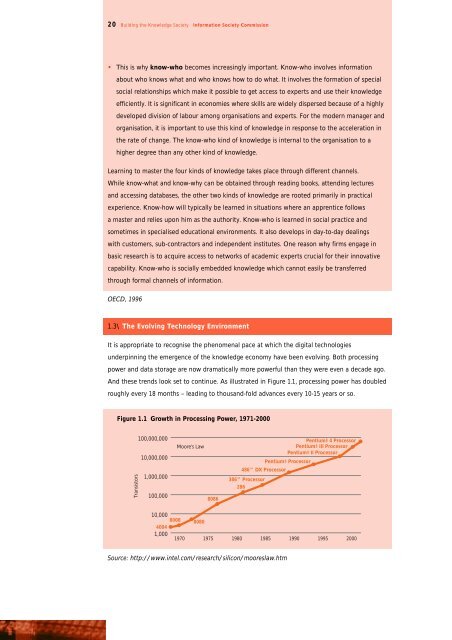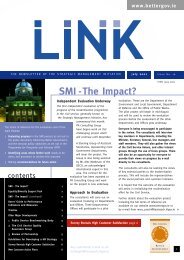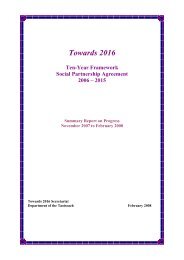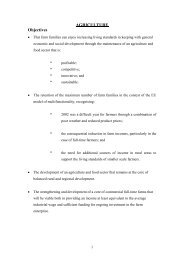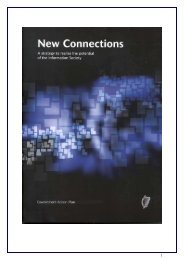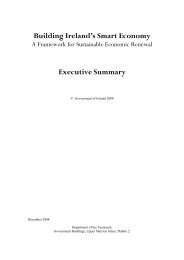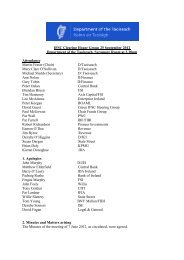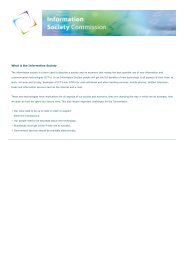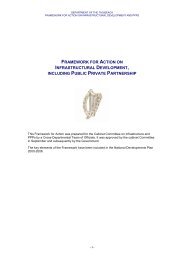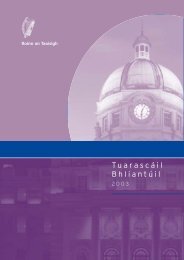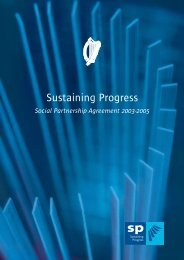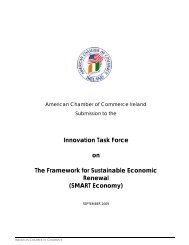Building the Knowledge Society - Department of Communications ...
Building the Knowledge Society - Department of Communications ...
Building the Knowledge Society - Department of Communications ...
You also want an ePaper? Increase the reach of your titles
YUMPU automatically turns print PDFs into web optimized ePapers that Google loves.
20 <strong>Building</strong> <strong>the</strong> <strong>Knowledge</strong> <strong>Society</strong> Information <strong>Society</strong> Commission• This is why know-who becomes increasingly important. Know-who involves informationabout who knows what and who knows how to do what. It involves <strong>the</strong> formation <strong>of</strong> specialsocial relationships which make it possible to get access to experts and use <strong>the</strong>ir knowledgeefficiently. It is significant in economies where skills are widely dispersed because <strong>of</strong> a highlydeveloped division <strong>of</strong> labour among organisations and experts. For <strong>the</strong> modern manager andorganisation, it is important to use this kind <strong>of</strong> knowledge in response to <strong>the</strong> acceleration in<strong>the</strong> rate <strong>of</strong> change. The know-who kind <strong>of</strong> knowledge is internal to <strong>the</strong> organisation to ahigher degree than any o<strong>the</strong>r kind <strong>of</strong> knowledge.Learning to master <strong>the</strong> four kinds <strong>of</strong> knowledge takes place through different channels.While know-what and know-why can be obtained through reading books, attending lecturesand accessing databases, <strong>the</strong> o<strong>the</strong>r two kinds <strong>of</strong> knowledge are rooted primarily in practicalexperience. Know-how will typically be learned in situations where an apprentice followsa master and relies upon him as <strong>the</strong> authority. Know-who is learned in social practice andsometimes in specialised educational environments. It also develops in day-to-day dealingswith customers, sub-contractors and independent institutes. One reason why firms engage inbasic research is to acquire access to networks <strong>of</strong> academic experts crucial for <strong>the</strong>ir innovativecapability. Know-who is socially embedded knowledge which cannot easily be transferredthrough formal channels <strong>of</strong> information.OECD, 19961.3\ The Evolving Technology EnvironmentIt is appropriate to recognise <strong>the</strong> phenomenal pace at which <strong>the</strong> digital technologiesunderpinning <strong>the</strong> emergence <strong>of</strong> <strong>the</strong> knowledge economy have been evolving. Both processingpower and data storage are now dramatically more powerful than <strong>the</strong>y were even a decade ago.And <strong>the</strong>se trends look set to continue. As illustrated in Figure 1.1, processing power has doubledroughly every 18 months – leading to thousand-fold advances every 10-15 years or so.Figure 1.1 Growth in Processing Power, 1971-2000Transistors100,000,00010,000,0001,000,000100,000Moore’s Law8086486 DX Processor386 Processor286Pentium® 4 ProcessorPentium® III ProcessorPentium® II ProcessorPentium® Processor10,000800840041,0001970808019751980 1985 1990 1995 2000Source: http://www.intel.com/research/silicon/mooreslaw.htm


